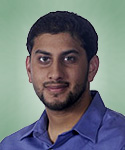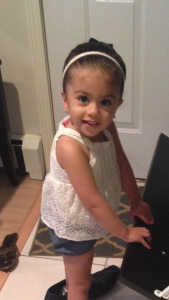November 27th, 2015
A Generation of Softies
Ahmad Yousaf, MD

Ahmad Yousaf, MD, is the 2015-16 Ambulatory Chief Resident in Internal Medicine at Rutgers New Jersey Medical School.
I watch as my almost-2-year-old daughter awkwardly climbs the stairs. I do not hold her hand, but I do not turn my back on her either. She is still clumsy, and her little bowed legs often miss their targeted landing spots. She holds on to the rail with a vice grip that steadies each monumental step forward and upward. Every so often she wobbles as she miscalculates the distances and her toes barely catch the edge of the next step. Her knuckles become white as she reorients herself, recalculates her next move, and ensures she does not tumble backwards. My palms sweat and my muscles tense during every mishap and sway… I want her to get to the top… but just as importantly, I want her to do it herself. After she regains her composure from a mini-spill, I cheer, “Good Girl!” I am close enough to catch her if she falls all the way down but not close enough that she can use me as a crutch to get where she needs to go. I think she senses this, and it gives her just enough confidence to keep going. Every fiber in me wants to get up and carry her the rest of the way, but I know the consequences down the road: She will always expect me to do it for her. She will cry and whine and, when it gets too hard, good old Baba will come to the rescue and move her to safety. She gets to the top and turns to look at me. I consciously look away as if I wasn’t watching her every move. “Baba… up!” The grin on her face makes me fall apart, and I run up the stairs and tickle her until she cannot breathe.
This is an everyday occurrence with her. Sometimes she fails and cries and looks up at me with her big green eyes begging for a hand to Providence (at which point I melt like any man would and give in to her tiny wishes) and other times, she gets back up by herself and tries again… and gets the job done.
I want her to be safe, but I do not want her to be ‘soft.’ This is the dilemma that most physicians in the academic realm struggle with every day in training the new generation of doctors. Psychology Today recently published an article that discussed what seems like an epidemic of individuals in college who are unable to cope with even the simplest unavoidable day-to-day adversities.
Although the article dismisses the fact that, historically, most psychosocial troubles that students faced were undiagnosed and swept under the rug and that the increase in numbers of those seeking help may just represent a generational recognition of the needs for those services, it still surfaces a serious concern. Many people in teaching/training positions in the medical academic realm believe that many medical students and residents lack resilience and self-sufficiency. With much discussion focusing on how to decrease burnout, increase physician (and docs in training) access to psych support, and better resident well-being, are we in danger of going too far the other way? Are we setting ourselves up for a generation of ‘soft’ doctors who lack the ability to handle the stress of an occupation defined by its intensity? Internists come face to face with mortality, familial strife, and enormous amounts of emotional distress, all while being expected to remain calm, cool, collected, and objective. The reality is, it’s the physician who is expected to carry the brunt of the stress and mold plans of action for multiple patients every day. Can a ‘soft’ doctor handle that level of responsibility? SHOULD a doctor handle that responsibility?
Then the question becomes: How do we turn out quality physicians who are armed with the tools (knowledge, skill, AND personal fortitude) from training systems in which the major concern is preventing burnout? This question is difficult, and the process will alienate many as being ill-equipped to handle the job.
Finding the balance between developing physicians with the capabilities needed to handle the realities of the job AND not burning out a large portion of them before they even get so see a patient autonomously must be the focus of those who control the avenues of training. I do not have a good answer for this question — both endeavors are extremely vital for the future of medicine. Perhaps the answer can be found somewhere in the tale of how a parent deals with his or her child climbing the stairs: letting them take risks, experience the consequences, know the taste of failure, encourage persistence, and celebrate eventual success. All I can say for certain is that the best part of parenting is when you get to celebrate with them when they’ve reached the top.
~Yousaf


A lovely and timely piece. The description of your daughter climbing the stairs was terrific!
Dr. Yousaf raises a fascinating conundrum that has actually been around for at least 80 years. When I was in medical school, my wife worked for an aging GP whose postgraduate training (2 years) required him to live in hospital-provided quarters and be available 24/7, and for this he was paid $35 a month plus room and board. He laughed at how “soft” we young doctors were, being paid as much as $750 a month and having “days off.” How were we to receive the same training, the same knowledge and experience, the same “hardening” as he and his colleagues had done back then (in the 1930s)? Somehow, I managed to survive a year of internship in an understaffed and over-burdened US Army hospital during the Viet Nam era. I was never on call less than every third day, and generally every second; I signed onto an orthopedic service of 120 patients one month. I learned a lot. My marriage, somehow, survived.
Later, I got to tell my “war stories” to credulous and easily-impressed younger physicians, who were glad to have had every third or every fourth day rotations on call and to have been paid a living wage while they were in training. I had the opportunity to watch a number of these younger physicians practice, and I never found that they did less well than I.
How much of what I experienced was a “hazing” ritual? How much of it was to test my mettle, to see if I was made of “the right stuff?” How much of it was needed for my education/training?
The parallel to watching his two-year-old daughter climb stairs is wonderful, and I think Dr. Yousaf for an acceptable metaphor. In my training, I was frequently abandoned by my medical “parents” to climb the stairs on my own, without assistance and without a safety belt. If and when I made mistakes, my patients were the ones who suffered the consequences, not I. If Dr. Yousaf’s daughter falls on the stairs, she is the one who hurts at the bottom of the stairs. If I mumbled the wrong prescription in my sleep at night and the nurse delivered it as ordered, I slept on, but my patient died.
So, in medicine, the issue is one step more complex. We know that physicians who are fatigued and overstressed and burned-out make more mistakes and learn less than those who are rested and confident. We also have a duty to protect the public from the ill effects of mistakes made by fatigued, overstressed and burned-out physicians – whether during training or at some other time in life. And we have a third duty to assure that the physicians we train are capable of surviving for many years in a profession that is, by its nature, stressful.
It is good to be discussing it.
Roger Howe, MD, MMM (retired)
Dr. Howe, I just want to thank you for your perspective on this. I’m at the very beginning of my training so I can’t really know what it was like “in the old days,” so to speak, but it seems to me that the very reason we’re talking about resiliency, mental health, and physician well-being is because those who came before us have said their training did not prepare them to deal with the challenges Dr. Yousaf mentions. Sure, doctors could grind out an amazing amount of work (and it really is incredible, no doubt about that) but as you say, patients suffered; and, at least from what I have heard, physicians suffered too, losing their caring and empathy in the face of all the work in front of them without time to reflect or recharge.
Again, I’m a student, but I feel that we’re being given a false dichotomy of either working 120 hours a week and becoming a strong doctor versus working 80 hours a week and becoming soft. Being a physician is challenging, and it does require fortitude to deal with all the big emotions and life changing events that comes with a career in medicine. However, it seems to me that the profession moved away from the kind of training you describe precisely because it does not equip doctors to deal with these things.
Ultimately, as you say, it’s good that this conversation is even being had.
Liat Bird, MSIV